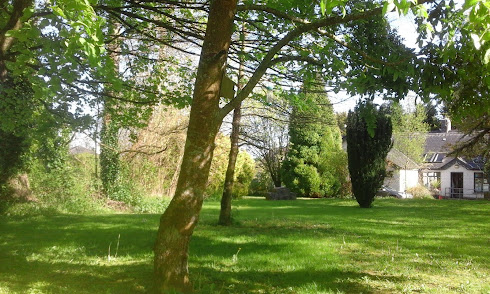Fadó, fadó Midir was tasked by Eochaidh with creating a road over the bog. Eochaidh did not keep his end of the bargain and sent out a spy to watch the spectacle. Midir then built a deliberate fault in the road, so it wouldn't last.
This story had been told orally for centuries before being written down by the monks who carefully recorded The Wooing of Etain in Lebor na hUidre and the Yellow Book of Lecan in the 12th and 15th Centuries.
The road in question was uncovered in the early 1980s at Corlea, near Kenagh, Co. Longford. Constructed in 148AD it was found to have lasted a very short time, around ten years, before sinking back into the bog which preserved it.
One theory is that it had a ceremonial use and so was needed only for enough time to fulfill its purpose. The people of the time experienced many years of failed crops and hunger, brought about by climate change, so drastic action was needed. Back then this involved a huge community effort, getting together to cut down the 100s of oak and birch trees needed to make the road, cutting, shaping and transporting them into place, before sacrificing their king to appease the gods and restore balance to nature and food abundance to the people.
Throughout history there have been other times when nature was out of balance requiring drastic measures. Now, with climate disasters making headlines we need action again. We can feel helpless when faced with global problems, but solutions may be found closer to home in our natural heritage.
We need community effort to plant trees, re-wild areas, add biodiversity and work with nature instead of against her. Time is running out to restore abundance and benefit all life. We can start with our own gardens.
This Heritage Week Scéalta Beo will show what we’ve been doing in a series of videos including some of the following: attracting pollinators, foraging in the garden, food forests, pond life, saving seeds, growing vegetables, keeping chickens and embracing weeds.
We are starting a collection of living stories: local plant heritage and lore. Pat Kelleher will share the story of the kale that has been growing for generations in his garden. He gave us plants last year and we have saved seeds to share at our in person event. Brendan Farrell will tell us of his grandfather’s golden osiers. We will have cuttings later in the year.
We would like your help to gather more living stories. Have you had an encounter with a frog? Are you re-wilding land? Have you a tree in your field for generations? Is your family growing vegetables together? Whatever your story, we would love to hear it. Get in touch to share it: scealtabeo@gmail.com
If you would like to tell us your story in person or have some seeds or chemical-free plants to swap come along to the 10th Anniversary event at Ardagh Heritage and Creativity Centre:
22nd August: 2pm-4pm
Plant, seed and story swap
We have been busy collecting seeds and growing plants to share. We are giving away seeds including Pat Kelleher's Kale in the hope that people will grow their own. We encourage you to bring chemical-free plants and seeds to swap. We'll use what we get in return in our gardens and keep seed to share next year. The aim is to build connections, biodiversity, and keep heritage seeds in circulation. This helps local food resilience and hopefully saves some rare heirloom varieties for the future.
The story collection is a very important element. Scéalta Beo means living stories and we hope to educate and inspire, as well tapping into and storing some vital knowledge, plant lore and memories for future generations. We want to encourage people to garden with nature instead of against it and save the planet while we're at it. Come along to start restoring the balance.
This event will be outdoors and held in accordance with Covid-19 restrictions. Feel free to bring your own refreshments or picnic, but remember to leave no trace.



No comments:
Post a Comment